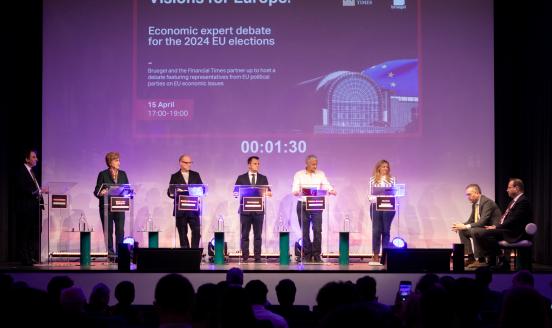Preliminary observations on the European Commission’s Android decision
Following the announcement that Alphabet (Google) will appeal the European Commission's ruling on the competition case against its Android mobile oper

How is the European Commission’s recent Android case likely to affect digital services in Europe going forward?
In July of this year, the European Commission announced that it had reached a decision in its competition case against Google (Alphabet)[1] related to the Android mobile operating system and associated applications.[2] Google is appealing the decision, and has just announced how it will comply with the Commission’s decision while the appeal is pending.[3]
As the decision is not yet public, and the specifics of Google’s appeal are likewise not known, it is neither timely nor productive to make assumptions on the details of the case. It is interesting, however, to consider the likely impact of the decision on the Android business model, the degree to which the Commission’s action impacts that business model, and the broader implications for the sector.
Key elements of the case
Google has chosen an overall business model where it provides the Android mobile operating system to mobile device manufacturers on an open-source-code basis, available to all without charge. This relatively ‘open’ model has allowed such manufacturers and application developers the ability to develop apps and services on top of Android that has contributed to the establishment of a huge, innovative Android-based ecosystem. This is a far more flexible and open set of arrangements than those provided by Apple, whose proprietary and closed mobile ecosystem provides the most prominent alternative to Google’s Android.
The Commission’s case[4] focused narrowly on three specific Google business practices. All of these relate in one way or another to apps that Google provides without charge to its wholesale original device manufacturer (ODM) customers or to mobile network operators. One of these apps is Play Store, which enables users to download from a large library of Android mobile apps. Others are Google Search and the Google Chrome browser, both of which are integral to Google’s primary targeted advertising business.
- The Commission found that Google effectively paid its wholesale device manufacturer and mobile network operator customers to refrain from installing competitors to its free apps. The Commission imposed a fine covering the period from 2011 (when Google Android is claimed to have become dominant) to 2014 (when Google discontinued the practice).[5]
- In licensing its free apps, including Play Store which effectively a “must have” capability for Device manufacturers, Google forced the device manufacturers to also install Google Search and the Google Chrome browser. The Commission found that this represents an improper tying of the services.
- The Commission also found that although Google permits device manufacturers to modify Android, it refuses to sell “must have” apps (notably Play Store) to device manufacturers that run these modified Android forks. The Commission’s explanation in its press release and elsewhere is however confusing at best, both as to the Commission’s understanding of Google’s business practices and as to their understanding of the avoidable harm associated with them. The press release neglects in particular to consider the difference between compatible forks (i.e. forks that can pass the compatibility test suite that Google provides[6]) versus incompatible Android forks.
Pending the outcome of Google’s appeal against the Commission’s decision, how must Google’s business practices change? What are the implications for other providers of digital platforms?
Implications for Google
While the appeal is pending, Google is obliged to ensure compliance with the Commission’s decision, which includes ceasing the practices found to be abusive.
There are substantial dislocations for Google and its ODM and mobile network operator customers, but the net effect of the changes on Google is unlikely to be as dramatic as might have been expected.
While the appeal is pending, Google is obliged to ensure compliance with the Commission’s decision, which includes ceasing the practices found to be abusive.
Our focus here is on the Commission’s second allegation, which relates to the bundling of Google Search and Chrome with Play Store and other Google apps. The issue of payments to refrain from installing competing search and browser applications presumably does not require Google to make any new accommodations, since they already discontinued the practice in 2014. As for the Android forks issue, there is no point in discussing it until the Commission’s reasoning is visible when the redacted decision is released.
In understanding the implications of the unbundling aspects of the decision, it is important to bear in mind that Google’s core advertising activities can be viewed as a two-sided or multi-sided platform – in the sense meant by Rochet and Tirole (2004).[7] In such an arrangement, the platform (Google, principally through its search engine, in this case) brings the sides of the market together.
Compensation can come from either or any side of a two-sided or multi-sided market. The platform makes the choice, taking into account the elasticities on all sides of the market, and any externalities. If done well, this can result in a virtuous cycle that promotes both usage and innovation, to the benefit of all. For example, in the case of broadcast free-to-air television, the advertisers provide the revenue – the service is delivered at little or no cost to consumers because doing so maximises consumer participation, which in turn makes the service valuable to advertisers.
This thinking is already visibly central to Google’s overall business model. In the case of Android, it can be assumed that Google has long since concluded for similar reasons that it is most cost-effective to provide their services for free to consumers, and to make Android and the Google apps available at no charge to device manufacturers in order to maximise the revenue that can be raised from advertisers.
Individual Android users have always been free to download Google Search and Chrome at no charge. No change to this policy has been announced, and we do not expect that this will change.
The Commission’s findings, as regards the bundling of Search and Chrome with Play Store, effectively prevent Google from obliging licensees of Play Store to also distribute Google Search and Chrome for devices shipped into the European Economic Area (EEA)[8] unless they voluntarily so choose. What will change is that Google will now introduce a paid licence agreement for Google’s mobile Play Store application suite for those devices shipped into the EEA.
The Commission’s decision therefore impacts Google’s business practices, but core aspects of Google’s business model should not change. The two-sided market logic is unlikely to change much solely on the basis of Google’s modifications. Google can be expected to continue to find it most efficient to derive the bulk of its revenue from advertisers, not directly from consumers. What is changing is Google’s relationship with device manufacturers, which will only have an indirect impact on consumers.
Google is still permitted to make Search and Chrome available to device manufacturers at no cost (or negative cost), and Google is presumably still motivated to encourage device manufacturers to make Google Search and Chrome available to consumers based on the multi-sided market considerations just noted. Many device manufacturers will presumably choose to pre-install Google Search and Chrome anyway, since these apps are popular.
Given that Play Store can no longer be used within the EEA as an incentive to ensure that Google Search and Chrome are automatically distributed on handsets, Google’s incentive to provide them to device manufacturers is reduced. That Google will no longer give Play Store away for free is logical.
In seeking to comply with the Commission’s decision, the path that Google has chosen to follow is exactly in line with the logic above. Google will no longer offer the standard version of the licensing agreement that covers Play Store and other Google apps (known as the MADA)[9] for devices that will be shipped into the EEA. Google are instead offering a new version of the MADA that enables device manufacturers to license the Google mobile application suite excluding the Google Search App and the Chrome browser, and separate licenses for Google Search and Chrome. They will now charge for copies of Play Store and Google apps under the new EEA MADA; however, Google Search and Chrome will be free under new licence agreements that provide for non-exclusive pre-installation and placement. Whether the incentives that Google pays to device manufacturers for pre-installing Search and Chrome will be greater than the charges for Play Store and the other Google apps remains to be seen.
What is interesting to note is that while Google is still willing to provide its search function for free – given that this runs to the core of its business model – it will charge for its Play Store on EEA devices, even though Play Store is considered a ‘must have’ for ODMs, given that users expect to find Play Store pre-installed on their devices.
Google’s advertising revenues will very much dwarf the payments that device manufacturers are obliged to make to Google for the use of Play Store and other apps. Although it is unclear whether the fee will be material to Google, it could be assumed that these licence terms must comply with fair, reasonable and non-discriminatory terms. It is clear that any future incentive payments made to device manufacturers will be less than Google’s advertising revenues, since they are a cost of obtaining those revenues. The relative magnitude of these various payments is important, but not yet publicly known.
Under the current Google MADA licensing arrangements, device manufacturers are already permitted to deploy alternative search and browser capabilities. This will not change.
In unilateral conduct cases it is not for the Commission to propose what remedial action the dominant company should undertake. [10] As the Commission’s press release notes, “It is Google's sole responsibility to ensure compliance with the Commission decision. The Commission will monitor Google's compliance closely and Google is under an obligation to keep the Commission informed of how it will comply with its obligations.” It is not yet clear how the Commission will react to Google’s remedial actions and whether it will ask for further steps to be taken.
How might the game change, then?
Implications for the sector
How might the game change, then?
The unbundling of Google Search and Chrome from Google’s Play Store might enable new forms of competition. Firms that offer competing browsers or search capabilities (such as Microsoft Bing) might possibly be better able to compete with Google Search and Chrome on the widely used Android platform. Device manufacturers such as Samsung that already pre-install their own browser might choose not to pre-install Google Chrome, or might establish an automatic preference for their own browser.
One intriguing possibility is that some competitors to Google might find ways to make their browsers or search capabilities more attractive to device manufacturers by means of deals, such as by paying the ODM to pre-install their search apps and/or browsers on an exclusive basis (this would be prohibited conduct for a dominant firm, but is presumably permissible for a smaller competitor).
Press reports indicate that Google will charge between $10 and $40 US per handset for Play Store and the app suite (other than Search and Chrome, which continue to be free). The higher charges will be for devices with higher pixel density, which is a measure of the quality and cost of the device. These charges are significant. The impact on handset prices paid by consumers is nonetheless difficult to assess without knowing the magnitude of the new incentives, and the way in which device manufacturers will accommodate them within their business logic.
The charges for Play Store and the other apps can be viewed as an increase in marginal cost that one might expect to be directly reflected in an increase in handset price; however, the incentive payments that Google makes for installation of Google Search and Chrome may be more than enough to offset them. If device manufacturers receive incentive payments from multiple providers of browsers, however, they might well regard the combined incentive revenues as a profit centre that is distinct from the cost of Play Store.
When all is said and done, then, and assuming that the Commission’s decision survives the appeal, will the decision have a net positive effect on societal welfare? Possibly yes, if competitors to Google Search and Chrome are able to capitalise on the breathing room that the decision provides them. The assumption is that if competitors are successful, consumers will probably benefit from enhanced choice and innovation. Whether advertisers benefit is not entirely clear.[11]
Of course, the Commission’s decision will also be scrutinised by any digital platform that may be considered to be dominant and that includes a ‘must have’ application. As such, the remedies adopted by Google, if accepted by the Commission, will be looked at as a source of inspiration for avoiding antitrust scrutiny.
Whether the net effect on societal welfare of this case can be viewed as being positive, neutral, or negative, weighing these potential benefits against the costs associated with the change, can probably only be judged some years in the future. However, this will reflect as much on the Commission’s enforcement priorities (which the Commission is actively reviewing)[12] as on Google.
Responsibility for the content of this piece rests with the authors alone. While Google is amongst the corporate members of Bruegel, membership gives no rights over Bruegel’s editorial decisions. For the sake of transparency, corporate members contribute equal amounts in subscription to Bruegel, which account for less than 1% each of Bruegel’s 2018 budget
References
[1] Specifically, the case is against Google LLC (previously Google Inc.) and Alphabet Inc., Google's parent company.
[2] European Commission (2018), “Antitrust: Commission fines Google €4.34 billion for illegal practices regarding Android mobile devices to strengthen dominance of Google's search engine”, 18 July 2018, http://europa.eu/rapid/press-release_IP-18-4581_en.htm viewed 28 October 2018.
[3] Hiroshi Lockheimer (2018), “Complying with the EC’s Android decision”, 16 October 2018, https://www.blog.google/around-the-globe/google-europe/complying-ecs-android-decision/ viewed 28 October 2018.
[4] European Commission (2018), “Antitrust: Commission fines Google €4.34 billion for illegal practices regarding Android mobile devices to strengthen dominance of Google's search engine”, op. cit.
[5] Ibid.
[6] Google (2017), Android Compatibility Definition, version 8.1, 5 December 2017.
[7] Jean-Charles Rochet and Jean Tirole (2004), “Two-Sided Markets: An Overview”, http://web.mit.edu/14.271/www/rochet_tirole.pdf viewed 1 November 2018.
[8] The EEA is comprised of the 28 current EU Member States plus Norway, Liechtenstein and Iceland.
[9] An old version of the MADA became publicly visible as a result of litigation. See https://www.sec.gov/Archives/edgar/containers/fix380/1495569/000119312510271362/dex1012.htm.
[10] Case T-201/04 Microsoft, ECLI:EU:T:2007:289, para. 1256.
[11] There is a natural analogy to advertising over free-to-air television, where the conventional wisdom is that advertisers need to be present on all significant platforms. Each significant platform therefore has some pricing power. Whether increasing the total number of platforms decreases total advertiser payments versus increasing them is not immediately obvious.
[12] The Commission is currently considering the role that competition policy should play in addressing concerns linked to the market power of digital platforms (see http://ec.europa.eu/competition/scp19/).



